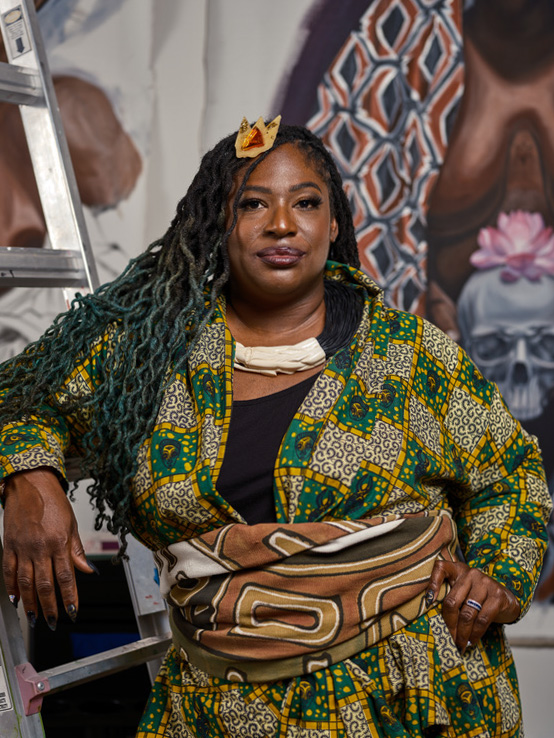It’s been 12 years since Elisheba Israel Mrozik picked up her first needle to start tattooing. The Memphis native and interdisciplinary artist now creates art on various canvases: from human skin to murals on the exterior of buildings.
And as the first Black licensed tattoo artist in Middle Tennessee, her legacy is forever etched in the history of her home state.
“I consider myself a culture bearer, a community connector,” Mrozik tells Sweet July of the work she does at her shop, One Drop Ink. She likes to think of her craft as creating art on the skin, stemming from her first love of painting and education at the Memphis College of Arts. That’s why she prefers clients whose tattoo inspirations can’t be found anywhere else.
Mrozik’s foray into the field was unexpected. She became interested in tattooing after seeing a post on Facebook of a tattoo that looked like a painting. “I didn’t even know that people could do that with tattoos,” she said.
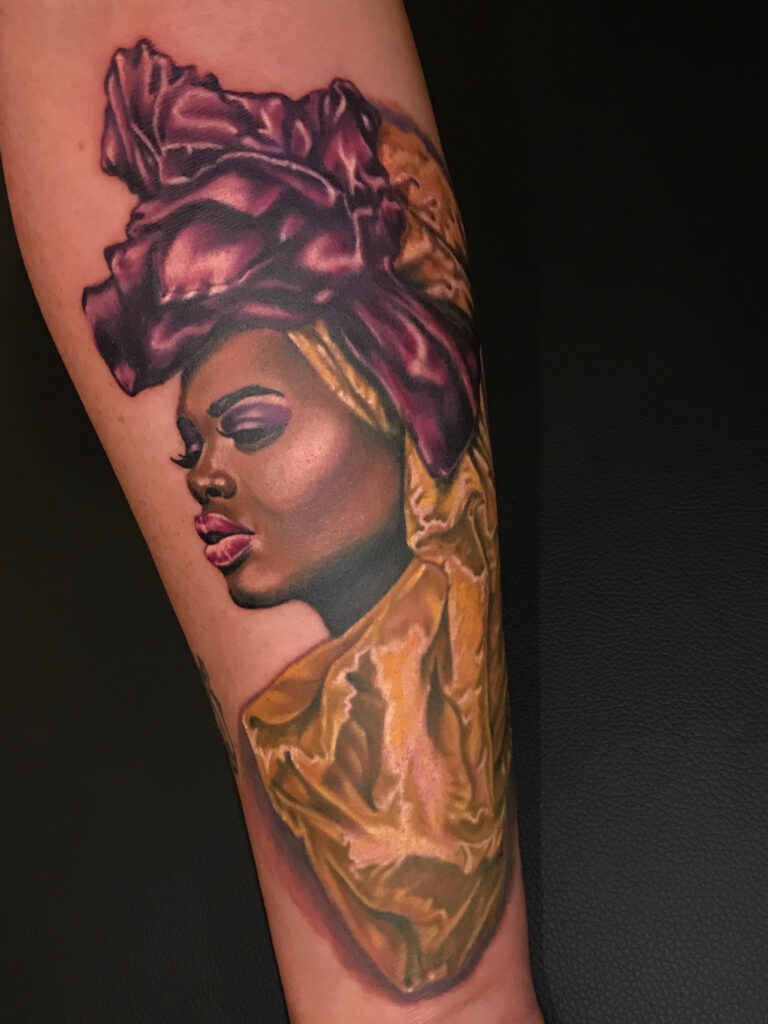
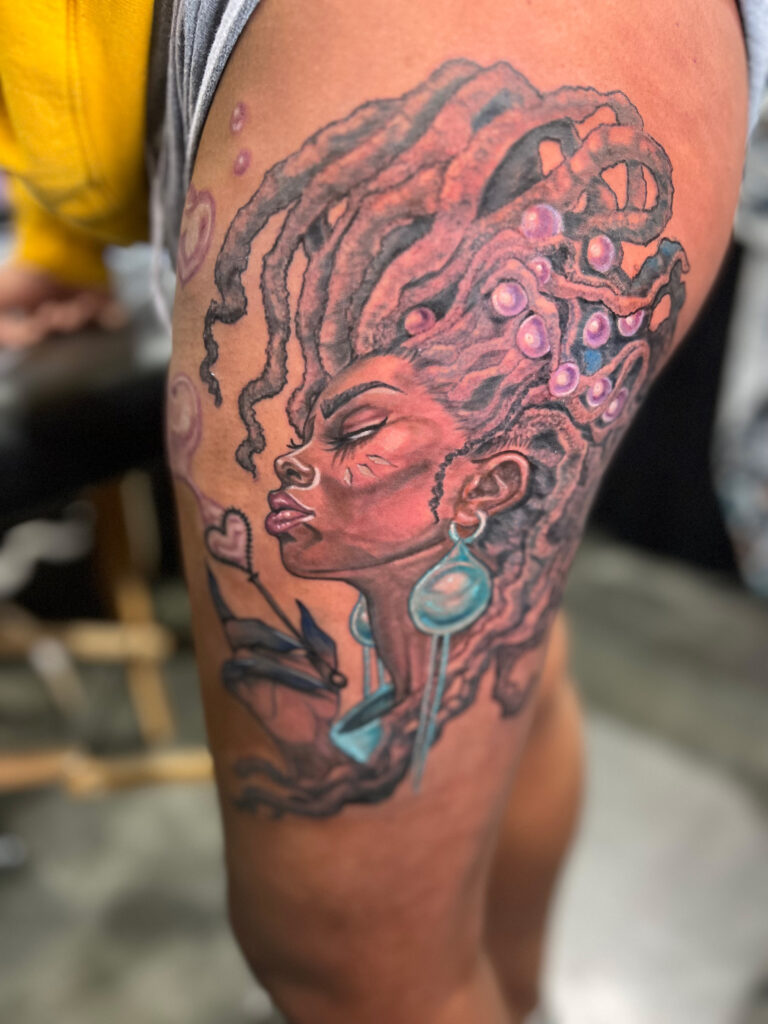
So she went down a rabbit hole on the internet to learn more about tattooing and to find more work that inspired her in that art form. In her search, she noticed a limited number of Black tattoo artists, and the ones who could do expansive work lived in New York or California. Even then, “I also didn’t see any of those amazing pieces on dark skin of any sort,” says Mrozik.
Her mission was born. In 2010, Mrozik started looking for apprenticeships, eager to learn how to tattoo on melanated skin. At the time, Mrozik was a 26-year-old single mother raising her daughter and working as a freelance artist painting artwork on merchandise at anime conventions to pay her mortgage. In Tennessee, you must apprentice for at least a year under someone who has been a licensed artist for at least three years to be allowed to tattoo legally. This would also cost her $4,000.
It was a process rife with sexism, racism and colorism, Mrozik recalls. “I did not know what I was stepping into. I naively walked into these spaces and had the door shut on me every time,” she says.
The wife of one tattoo shop owner gave Mrozik the “yes” she needed to get her first apprenticeship, which started in January 2011 (despite the hesitancy of the shop owner and lead artist overseeing the apprentices). For weeks, she and two other white male apprentices would clean the shop, scrub the tubes of the tattoo machines and answer the phones. She would watch the artists in the shop tattoo in between that work and ask questions about the process. Eventually, she would get the opportunity to practice on fake skin and people, but throughout that time, the lead artist refused to talk to her or teach her.
By March, Mrozik was fired from her apprenticeship after the shop changed protocols, which conflicted with her approved time off to participate in her best friend’s wedding.
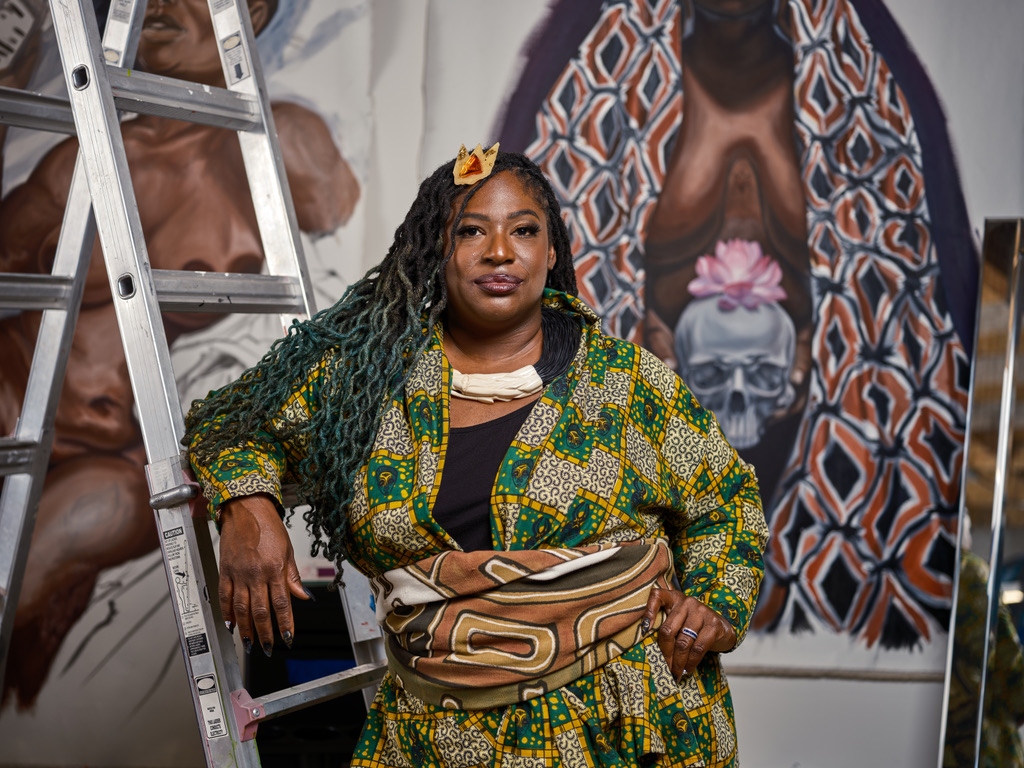
“I have this saying that I say to myself when I have to deal with dumb stuff or face some sort of adversity, and it is that ‘my ancestors dealt with worse,’” says Mrozik. “That is how I try to look at things when they are tough.”
With only three months of apprentice work under her belt, Mrozik had to figure out how to complete the remaining time required to be licensed. She decided to revisit the Tennessee law on tattoos and realized that she wasn’t required to have a license to own a tattoo shop. She just needed a licensed tattoo artist to work in the shop. So with her $3,000 tax refund that year, Mrozik rented a room next to the NAACP Nashville office on Jefferson Street, a historical street known as a prominent epicenter for the city’s Black culture. In May 2011, she opened the doors to One Drop Ink and hired her first licensed tattoo artist from a Craigslist ad. She would go on to finish her apprenticeship under her first employee. Today, One Drop Ink employs six women artists and one man.
“I never wanted to own a shop,” says Mrozik. “I just wanted to tattoo.” But with One Drop Ink, she’s been able to make a bigger impact. Mrozik believes the shop has become a place for Black people to get a tattoo safely without being poorly serviced by unlicensed people or overcharged.
Beyond tattoos, One Drop Ink has always been a place honoring its community. When the 2020 tornado destroyed the shop’s neighborhood, Mrozik and her artists held a food and water drive. During the pandemic, the shop painted a mural to raise money for artists out of work. One Drop Ink also started the Jefferson Street Art crawl with artists in North Nashville and turned it into a nonprofit called North Nashville Arts Coalition. “We wanted to make it a fully inclusive neighborhood and community event that highlights the art and creative economy of North Nashville,” says Mrozik.
These days, Mrozik says she is ready to put down the needle and expand her personal brand, Queen Bee Ink, to create a space for marginalized creatives to grow in their art. “I want an open, inclusive space for Black artists, creatives of color, women artists, and people who don’t have and have been refused the opportunities to be what they want in other spaces,” she says.
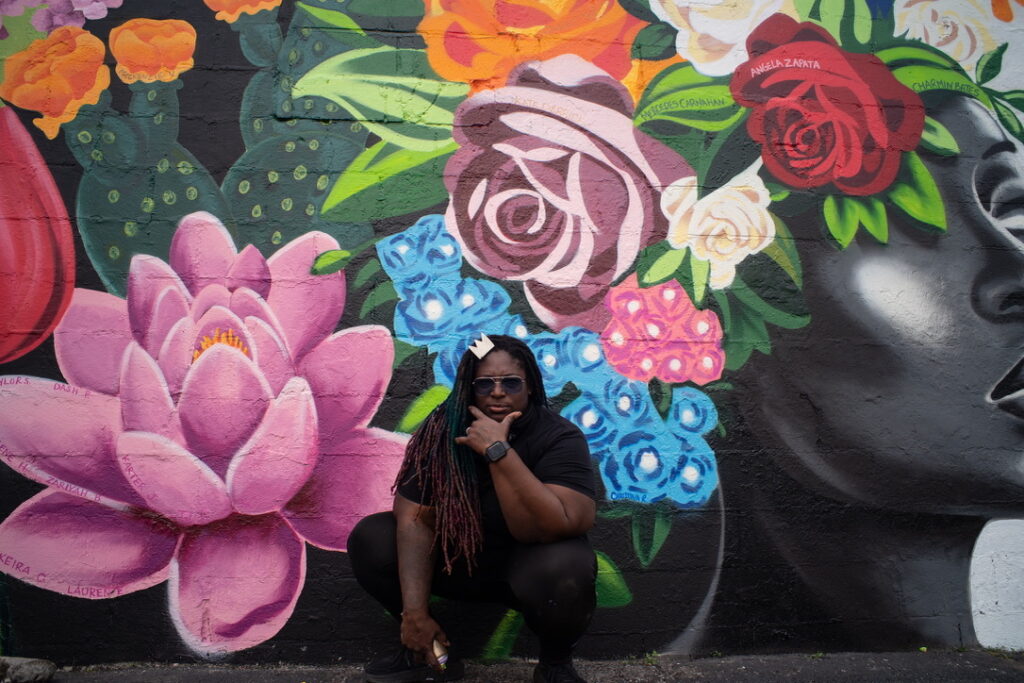
Down the line, Mrozik also has plans to sell more products that help heal and maintain tattoos on melanated individuals, with dreams of working with a Black chemist. She currently makes her own aftercare products consisting of natural butters that she sells at the shop. “[Tattoo artists] think they can’t do a good tattoo on someone who is dark-skinned, and that’s a narrative that’s been pushed for decades amongst tattooers,” she says.
With Mrozik’s help, fresh narratives promoting inclusion and equity within the tattoo industry are here to stay—and will extend to future generations of artists.
“I want to be able to give all of the things that I’ve learned to another Black woman in this industry,” says Mrozik. “She’ll be able to take it and give it to somebody else to grow it.”
